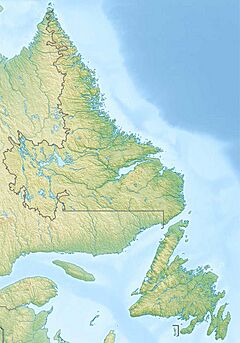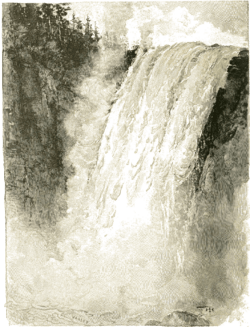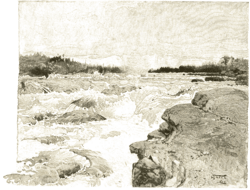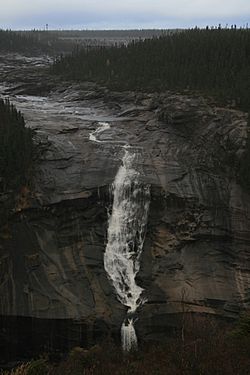Churchill Falls facts for kids
Quick facts for kids Churchill Falls |
|
|---|---|
| Grand Falls | |
| Lua error in Module:Infobox_mapframe at line 185: attempt to index field 'wikibase' (a nil value). | |
| Location | Labrador |
| Coordinates | 53°35′39.44″N 64°18′28.05″W / 53.5942889°N 64.3077917°W |
| Type | Segmented Block |
| Total height | 74.7 m (245 ft) |
| Watercourse | Churchill River |
| Average flow rate |
6 m3/s (210 cu ft/s) |
Churchill Falls is a huge waterfall in Labrador, Canada. It is about 75 meters (245 feet) tall. The falls are on the Churchill River.
Long ago, Churchill Falls was one of Canada's most amazing natural sights. But now, most of the river's water has been moved. This was done to power the Churchill Falls Generating Station. So, only a small stream flows over the rocks where the mighty falls once roared.
Contents
Why the Name "Churchill Falls"?
The falls have had a few different names over time.
Grand Falls
In 1839, an explorer named John McLean called them the Grand Falls. This was because the river itself was often called the Grand River. This name came from the local Indigenous name for the river.
The Innu people, who lived in the area, had their own special name for the falls. They called it Patshishetshuanau. This means "Place where the Current Makes Clouds."
Changing Names
Later, in 1821, the river was renamed after Charles Hamilton. He was the governor of Labrador at that time. But people still mostly called the falls "Grand Falls." Sometimes, they called them "McLean Falls" after the explorer.
Then, on February 1, 1965, something big happened. The leader of Newfoundland and Labrador, Joey Smallwood, officially renamed the river and the falls. He named them after Winston Churchill, who used to be the Prime Minister of Britain. This change happened just before a huge project to build a power plant at the falls.
History of Churchill Falls
The falls were very important to the local Indigenous peoples.
Ancient Beliefs
The Innu people had a special belief about the falls. They thought that looking at these powerful falls could bring death. Because of this, they had a strong rule against visiting the falls. This rule lasted until the early 1900s.
First European Visitors
In 1839, John McLean and his team were the first Europeans to reach the falls. They were trying to find a river route for the Hudson's Bay Company. McLean was a bit annoyed because the falls blocked their direct path. But he was also amazed by how grand and powerful the falls were.
In 1894, another explorer named Albert Peter Low from the Geological Survey of Canada also visited the falls.
Building the Power Plant
People started thinking about using the river's water for power as early as 1915. But back then, it was too difficult to do.
Later, in the 1950s, things changed. New iron ore mines were built in western Labrador. Also, a railway was built in 1954. These new developments made the power project possible.
So, in 1967, construction began on the Churchill Falls Generating Station. By 1970, almost all of the Churchill River's water was moved. It was sent into a large storage area (a reservoir) upstream from the falls.
Now, only a small stream flows over the falls. Even when the reservoir is completely full (which happens about once every ten years), only about 10% of the original water flows over the falls.
Legacy
The town nearby is also named after the falls. It is called Churchill Falls.
See also
 In Spanish: Cascadas Churchill para niños
In Spanish: Cascadas Churchill para niños
 | George Robert Carruthers |
 | Patricia Bath |
 | Jan Ernst Matzeliger |
 | Alexander Miles |






